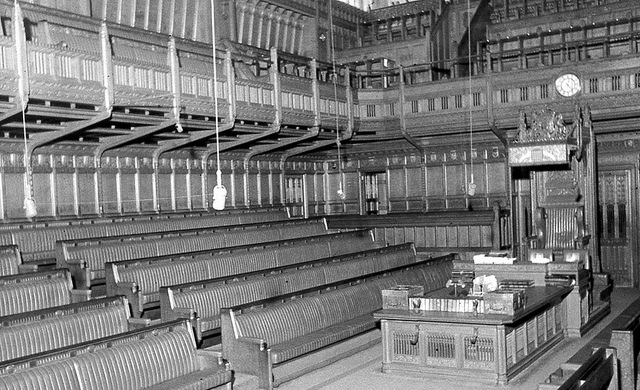The general election campaign may have started, but the ground has yet to move.

Whilst the front lines of the Great War were laid out in salubrious French Chateaus over the finest wines, George Osborne was pictured finalising the 2015-16 spending review and marking out the battle grounds of the next general election over burger and chips.
The intended symbolism of the Treasury spinners was hard to avoid; during these times, in which a further £11.5bn in cuts need to be made to government spending, we need to roll our sleeves up, eat honest, man-of-the-people food to avoid looking posh and to get on with the job at hand.
The Chancellor’s midnight snack followed weeks of negotiation between the Treasury and Whitehall departments to agree a further round of ten per cent cuts to Justice, the Cabinet Office, Defra, Communities and Local government and, in an act of leading from the front, the Treasury itself.
The front runners were soon followed by 9.5 per cent reductions to Work and Pensions, 9 to Transport and 8 t to the Foreign and Commonwealth Office, with Culture, Media and Sport and Business bringing up the rear with 7 and 6 per cent respectively.
Perhaps it was only fitting that during a time of impending political warfare that the Ministry of Defence escaped with only a 1.5 reduction, following an expertly conducted press briefing campaign by its Secretary of State Philip Hammond.
In previous parliaments cuts on this scale would have been a defining ideological event, but in the context of previous reductions in government spending and years of global economic gloom today’s spending review stands only as a skirmish of a larger, on-going conflict.
But, like the Chancellor’s diet, the economy is in desperate need of vitamin packed green shoots. Ed Balls, Labour’s Shadow Chancellor, taunted the coalition government after Mr Osborne made his announcement to the House of Commons with their 2010 projection of 6% growth by the time of the election and plan to eliminate the structural deficit.
It is a tactic they have used before but voters remain unconvinced by Labour’s plans and polls still put the government ahead on economic credibility. Furthermore, the government have had their hand strengthened by the failure of the Labour praised recovery plan recently implemented by French President François Hollande.
Ed Balls and his party leader, Ed Miliband, hoped President Hollande would provide the necessary proof to change the British public’s opinion on borrowing to end austerity, but instead the government have been provided with further breathing space in which to hope that the UK’s economy will sufficiently recover in time to go into the next election on a platform of growth and responsibility.
Though they now only admit it through gritted teeth, the opposition’s plan and electoral strategy is to borrow to invest in jobs and infrastructure. Whilst this initially appears to be a radical alternative to the government’s austerity programme it raises the question of whether the government has actually embarked on an austerity programme at all.
Even with today’s cuts the government intend to spend £4bn per year more on investment projects than the last Labour administration, whilst public spending will reach £745bn during 2015-16 – £76bn more than Gordon Brown spent during 2009-10.
The Chancellor argues that the deficit has been brought down by a third during the last three years, but borrowing itself has actually risen. If truth is the first casualty of war, then objectivity is the first casualty of politics as in the run-up to an election it is rhetoric and slogans that will sway voters.
In 2015 it will not matter that spending and borrowing has increased. The opposition will slam the government over cuts and the two parties in power will counter this criticism by claiming that they are clearing up Labour’s mess and political, deafening the public with a political white noise that will continue to obscure the economic reality.
Within the government itself, the Conservatives will be free to argue that they would have gone further and faster in reducing the national debt but they were unable to do so because their junior partners, the Liberal Democrats, held them back.
Conversely the Liberal Democrats will stand on a ticket of holding back the Conservatives’ worst excesses, whilst taking the reins of government with maturity. The victorious Great War Liberal Prime Minister David Lloyd George though provides a warning to his Whitehall descendants; he won the war but was soon to see his party fall from power for almost a century.
Just like the numerous attempts to claim fresh ground on the Somme, today’s announcement failed to move the conflict in Westminster forward by a single inch. The government and opposition have stayed fixed to their lines and continue to lob the same grenades they have been using for three years whilst the economy lies clinging to life in No Man’s Land, waiting to be retrieved and revived.

 Hot Features
Hot Features












